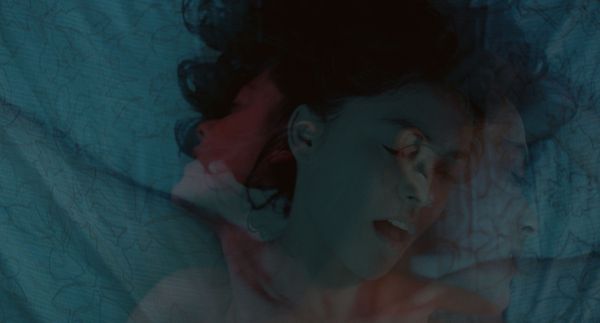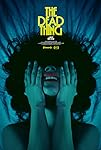Eye For Film >> Movies >> The Dead Thing (2024) Film Review
The Dead Thing
Reviewed by: Jennie Kermode

In the opening shot of Elric Kane’s slow burn dark romance, which is screening at both the Fantasia International Film Festival and Frightfest this year, we see a woman walking along a dark hallway looking at her phone. Her face is illuminated by its wavering light like that of a traditional Gothic heroine with a candle. It’s thematically pertinent but it also functions as a statement of intent in a film which is at once very much of the moment and concerned with primordial passions.
Like many people her age in Los Angeles, Alex (Blu Hunt) uses a dating app to manage her sexual/social life, which has to be squeezed in around a busy work schedule. Office hours are spent in a small, dimly lit space where she and a colleague organise data and printing, with little apparent space for real decision-making or creativity. Afterwards she cheers herself up, or tries to, by meeting strangers in bars or restaurants. Sometimes they click, sometimes they don’t. When she meets Kyle (Ben Smith-Petersen), it’s immediately apparent that they have chemistry.

Sometimes love comes out of the blue. More often, it’s preceded by an odd sensation almost like recognition, or homecoming. Alex and Kyle seem to have that connection, something that unfurls within the imagination, hinting at infinity. They’re not slow to exercise their sexual passions, but they’re relaxed, as if they know it doesn’t all need to be fitted into one night. They also spend time talking, laughing, drawing pictures of one another and listening to music. There’s an enormous sense of contentment about it. She even confides in him about her troubles, the way that her days feel all the same. “Do you ever feel that there’s just no escape?” She wants more, of course. He seems to as well, but when she sees him again, he’s with another woman. on impulse, she follows them. What she learns about him will chill her to the bone – and yet still she will be reluctant to give him up.
The two leads are excellent, with notably impressive support from John Karna, who arrives halfway through and goes on to deliver what is perhaps the film’s most overtly horrific moment. Hunt has a wonderful liveliness about her which is much more interesting than mere beauty. It’s easy to see how she could not just grab but hold onto somebody’s attention, and this quality also gives us a stronger sense of what’s at stake. Smith-Petersen, meanwhile, brings a real sensitivity to his role despite his muscular physique. He’s a stuntman with relatively little acting experience, yet still manages to seem vulnerable, especially as we learn more about Kyle. It’s easy to understand this character’s desperation, but the performance is what keeps us rooting for things to work out beyond the point where we reasonably should.
Kane is careful not to put all the blame on the couple’s specific circumstances. Alex’s flatmate Kara (Katherine Hughes) is also in a messy situation, and as her relationship breaks down, the friendship which once helped both women to cope is neglected, a ghost of what it was. Meanwhile, Alex’s colleague Mark (Joey Millin) struggles to understand boundaries and the difference between many and any.
Overall, it’s a grim picture of a nocturnal city where everything feels temporary; where nothing is on firm foundations and at any moment disaster might strike. Perhaps that wouldn’t be so bad compared to the crushing monotony of existing without really living. Happiness is fleeting; moments of real connection are rare; and love that last forever, well, that might be even worse.
Reviewed on: 28 Jul 2024















